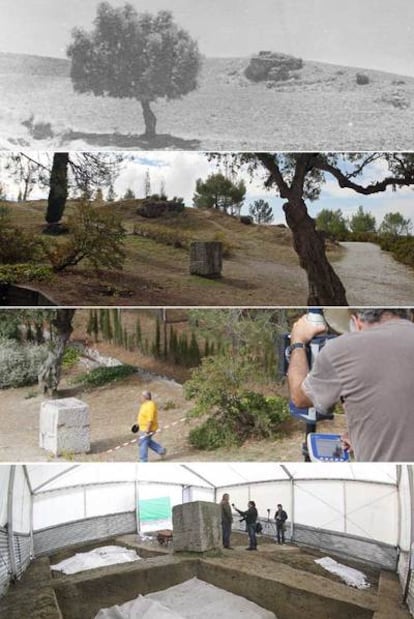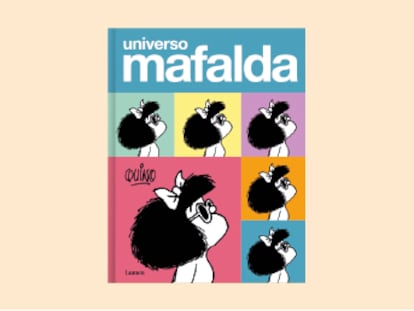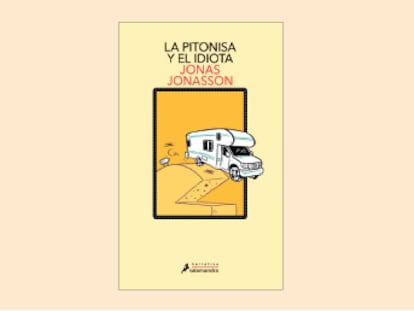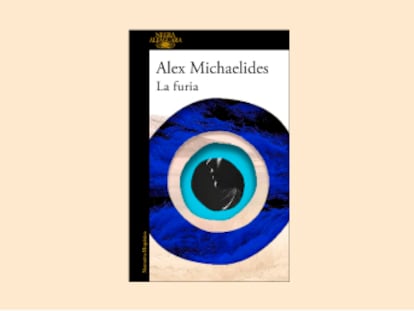Lost hope for Lorca's missing grave
Other victims' relatives and hispanist Ian Gibson wish for search resumption
"Not a single bone. Not even a splinter, no matter how small." Francisco Carrión, head of the team digging in Alfacar, near Granada, for the remains of a man shot and buried in a mass grave during the Civil War, made this statement exactly one year ago. The team had spent nearly two months searching for the body of Francisco Galadí, a bullfighter who was thought to lie in the same grave as Federico García Lorca, and the media pounced on the possibility that the famous poet's body might also turn up during the search.
But 73 years after the execution and an investment of 70,000 euros in the search effort, the only thing that experts found in the ground was an enormous rock. The regional government of Andalusia, which sponsored the dig, has already said it has no intention of continuing the effort. The most famous poet in Spain will, for now, continue to also be the country's most famous missing person.
"Now is not the right time. There are other graves to open and we're in a crisis"
"That was the spot that most of the historical references pointed to. We did everything in our power. We were never searching for Lorca, but for Francisco Galadí, as his family requested. We closed the case and put the file up on a shelf. We will not continue to look for that grave anywhere else," declares Juan Gallo, the Andalusian government's commissioner for the recovery of historical memory.
But Galadí's family and the adopted daughter of another man buried in the same grave, Nieves García, will not give up. "Now is not the right time. There are other graves to open, other executed people to find, and we're in a crisis. We can't ask for money for this again. We need to wait. But I do want them to look for my grandfather again in future," says the matador's grandson, also named Francisco. "The fact that they were not found at the excavation spot was a huge letdown after waiting for so many years. But he's got to be there, maybe 15 or 20 meters away..."
Nieves García is of the same opinion. "Of course I want them to keep searching for my grandfather. I still harbor the hope of finding him. I think he is in the area - very nearby. But I understand that everyone with a relative who was executed wants to recover the remains, and in this crisis situation it is not the right moment. When the crisis passes, yes."
For Nieves, the desire to find her grandfather caused a rift with her family. One of her stepsisters (Nieves was adopted when she was three days old) opposed the search for remains in Alfacar. The dig lasted 47 days, and the selected spot had the backing of researchers and witnesses who were contacted by the provincial authorities of Granada. There was also the testimony of Manuel Castilla, the man who buried the bodies, and who once took the hispanist Ian Gibson to the spot where he said he had laid them in the ground. Five archeologists scoured 276.75 square meters and extracted 75.76 cubic meters' worth of sediment. But not one bone turned up - just a large, ancient rock that proved that there had never been any burials in that particular spot.
Gibson, who has spent 45 years studying Lorca, is not giving up, either. Last week he presented a new book, La fosa de Lorca, crónica de un despropósito (or, Lorca's grave, the chronicle of an absurdity), which he says helped him vent his frustration. "I feel sick. I think about this all day long. I fear for my mental health," he confessed to this newspaper two days before reading the report that recorded the failure. "In order to try to keep a balance, I wrote a diary that ended up as this book. I felt very anguished. I was getting calls from the US, France... to ask me about the dig, and I knew nothing because nobody from the Junta [Andalusian regional government] called me or consulted me, despite the fact that they once gave me a medal for my books on Lorca. I think they were very wrong not to expand the search area. He could be outside the park, a few meters away under a pine grove that I think was planted to conceal the graves."
Gibson also laments the fact that the Junta ignored statements by the vice-president of Granada's provincial authority, who said that during construction work for the García Lorca park "some bones were found, placed inside a bag and buried elsewhere." The hispanist also suggests there might possibly be a pact of silence between the regime and the Lorca family, which has always opposed looking for the poet's bones.
"If the [conservative] Popular Party wins the next elections, it will do nothing to look for Lorca," adds Gibson, arguing that the PP still wants to prevent the country from examining the "holocaust" that took place in Spain. "I am 71 years old. And the failure of this search will pain me to the death."

Babelia
Tu suscripción se está usando en otro dispositivo
¿Quieres añadir otro usuario a tu suscripción?
Si continúas leyendo en este dispositivo, no se podrá leer en el otro.
FlechaTu suscripción se está usando en otro dispositivo y solo puedes acceder a EL PAÍS desde un dispositivo a la vez.
Si quieres compartir tu cuenta, cambia tu suscripción a la modalidad Premium, así podrás añadir otro usuario. Cada uno accederá con su propia cuenta de email, lo que os permitirá personalizar vuestra experiencia en EL PAÍS.
En el caso de no saber quién está usando tu cuenta, te recomendamos cambiar tu contraseña aquí.
Si decides continuar compartiendo tu cuenta, este mensaje se mostrará en tu dispositivo y en el de la otra persona que está usando tu cuenta de forma indefinida, afectando a tu experiencia de lectura. Puedes consultar aquí los términos y condiciones de la suscripción digital.
































































